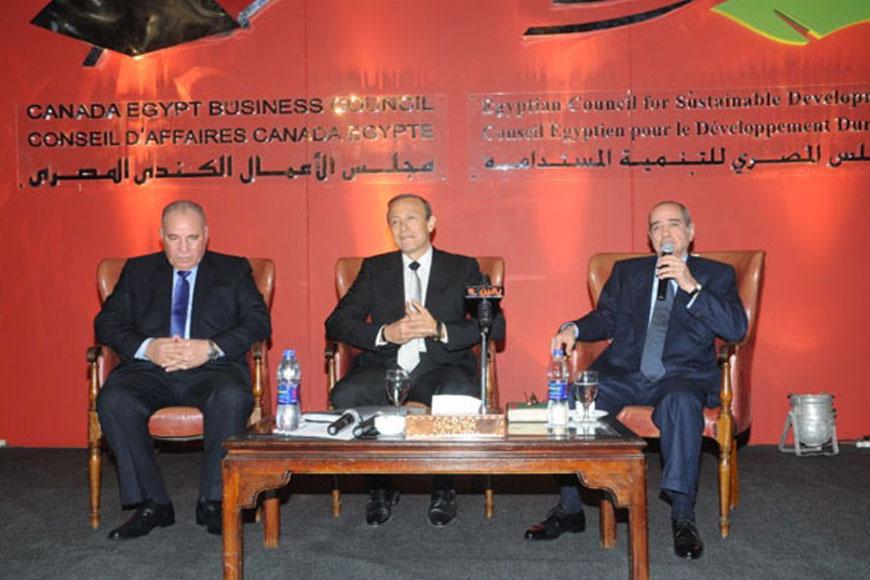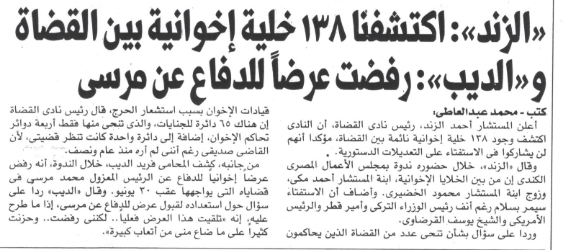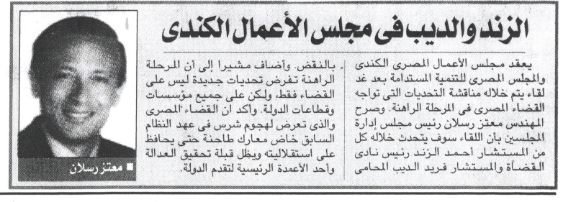
Date
Speaker(s)
Designation
Description
The Canada Egypt Business Council (CEBC) and the newly-formed Egyptian Council for Sustainable Development (ECSD) hosted a special event and panel discussion featuring head of the Egyptian Judges Club Counselor Ahmed El-Zind and renowned lawyer Counselor Farid El Dib. The discussion revolved around the triumphant struggle by the Egyptian judiciary against infringement by the former regime on its independence, its historical role in guarding the neutrality and independence of the judiciary, and the reform needed for the judicial system.
Over 200 distinguished attendees were present at the event from former ministers, ambassadors, CEBC members and guests, among whom was the Minister of Social Solidarity, H.E. Ahmed El Borai, in addition to a number of former ministers including H.E. Fayza Abo El Naga, Counselor Yehia El Gamal, Dr. Hany Helal, Eng. Alaa Fahmy, Counselor Adly Hussein. Also present were H.E. David Drake, Ambassador of Canada to Egypt, in addition to their Excellencies the ambassadors of Georgia, Serbia, Cuba, Kazakhstan and Armenia.
CEBC Chairman, Eng. Motaz Raslan, delivered the opening remarks emphasizing the importance of the following day, which marked the first day of the two-day referendum on the then-draft constitution (the constitution was passed by the overwhelming majority of 98.1% on January 18). He also encouraged all citizens to take part in the referendum, asserting its significance for the transitional roadmap stipulated in July 3 following the ouster of Mohamed Morsy, the former president.
“Justice is the basis of sovereignty” Chairman Raslan said asserting the quintessence of a fair nonpartisan judiciary. He highlighted the challenges the judiciary faced throughout Egyptian history, with the worst period being the tenure of Morsy. Morsy had a number of battles with the judiciary during which he dismissed the prosecutor-general, challenged court decisions, immunized his decisions against judicial review and allowed his supporters to besiege the Supreme Constitutional Court (SCC) and preventing judges from presiding over cases. Raslan then hailed the judiciary for its role as “a source of inspiration” for the June 30 revolution.
Counselor Farid El Dib, the defense lawyer for a significant number of controversial cases, commended Counselor Ahmed El Zind for his resistance of the dangers, which faced the judiciary under the former regime, amid applause by the attendees. El Dib, however, asserted that the judiciary has no place in political battles, as established by law, and added that its main challenges are limited to the preservation of its neutrality and independence. The veteran lawyer said that the current battle for independence of the judiciary comes in continuation to a struggle that commenced decades ago, citing the highlights of the judiciary’s fight for its independence with successive regimes. El Dib himself was dismissed unlawfully by an executive decree, as a judge, among scores others in 1969; a decision that was later overturned in court.
Nevertheless, El Dib affirmed that aggression against the judiciary under Muslim Brotherhood rule was unprecedented. He described the violations against the judiciary as “lowly”. He said that it was a first in the history of Egypt that a president would insult judges by name. El Dib also cited another example of this aggression, which was a draft law to reduce the age of retirement of judges from 70 to 60 years. By implication, El Dib explained, 3500 judges would have retired and – due to the severe lack in judges – replaced by MB-loyal men. He said that people need to unite with judges in the defense of their independence and neutrality, “as one never knows when he will be standing before a judge and his rival is a man of influence”.
El Zind, who assumed the floor after El Dib, concurred with the later as to the great sacrifices made by several judges over the course of history for the sake of their independence, describing his role as minute compared to them. The head of the influential Judges’ Club, an unofficial body representing judges which was in the forefront of a large number of judiciary battles, El Zind spoke of the judiciary’s fray with the MB regime. He explained that judges were not in a position of rivalry nor of friendship to the group, before the standoff between them. El Zind said that the aggression against the judiciary started from the Islamist-dominated People’s Assembly, which commenced scathingly criticizing the judiciary shortly after it was elected. He said that members of parliament were insulting the judiciary in a vulgar manner, describing the parliament as a bunch of “barking dogs”.
The Counselor added that the judges saw in the aggression against them an organized campaign, which he believes was prepared years in advance for the infiltration and the “Brotherhoodization” of the judiciary. El Zind pinpointed that the height of the battle was the besieging of the SCC by a number of “gamblers”, which dangerously undermined the state of law. El Zind said that also among the actions that sparked the battle was the dissolution of the people’s assembly by a court decision, which Morsy tried to overrule by executive decree. Morsy eventually rescinded his decree following pressure from the judiciary. The counselor also mentioned physical and verbal attacks on judges, during the “Morsyera”.
On the referendum on the constitution, Al Zind called on the attendees to participate, saying that a big yes vote would be for the great disadvantage of those who conspire against Egypt. The Counselor added that it is key that the results of the referendum reflect the true size of the proponents of the roadmap and the supporters of the MB. He especially commended on the role women have to play in the referendum.
On judicial reform, El Zind said that the judicial system requires “holistic development”, as opposed to “purging” – a term often used by the opponents of corruption in the judiciary. He said that a large number of laws is outdated and in bad form due to multiple incoherent amendments. He added that courts are bloated with a large number of cases, which do not customarily fall under the jurisdiction of the judiciary, but of technical bodies. The floor was briefly opened for questions and comments.
Responsible for adjudicating cases pertaining to pre-January 25 corruption and post-January 25 killings of protestors, the judiciary was in the forefront of almost every controversy for the past three years. It also played a key role in the June 30 revolution last summer. However, room for development and the dire need for the establishing the rule of law, make it an ever more prominent player in the time to come, now that Egypt is taking steady steps on its path towards democracy undaunted by religious despotism.
The floor was then opened to questions raised from the floor covering different issues with regards to new laws and the development of the judiciary system in the coming phase.





























